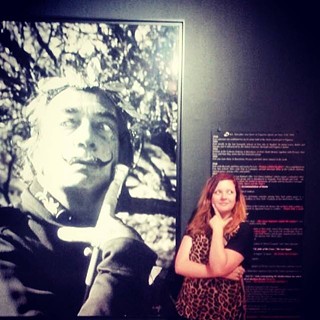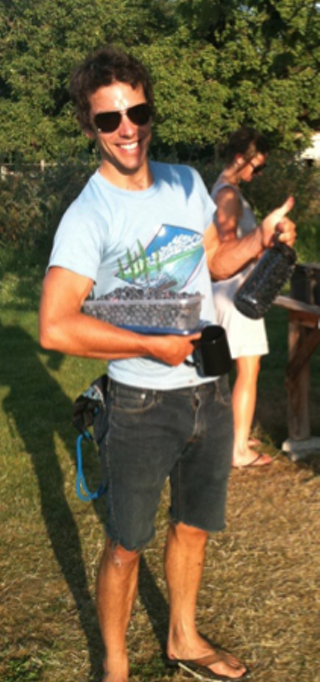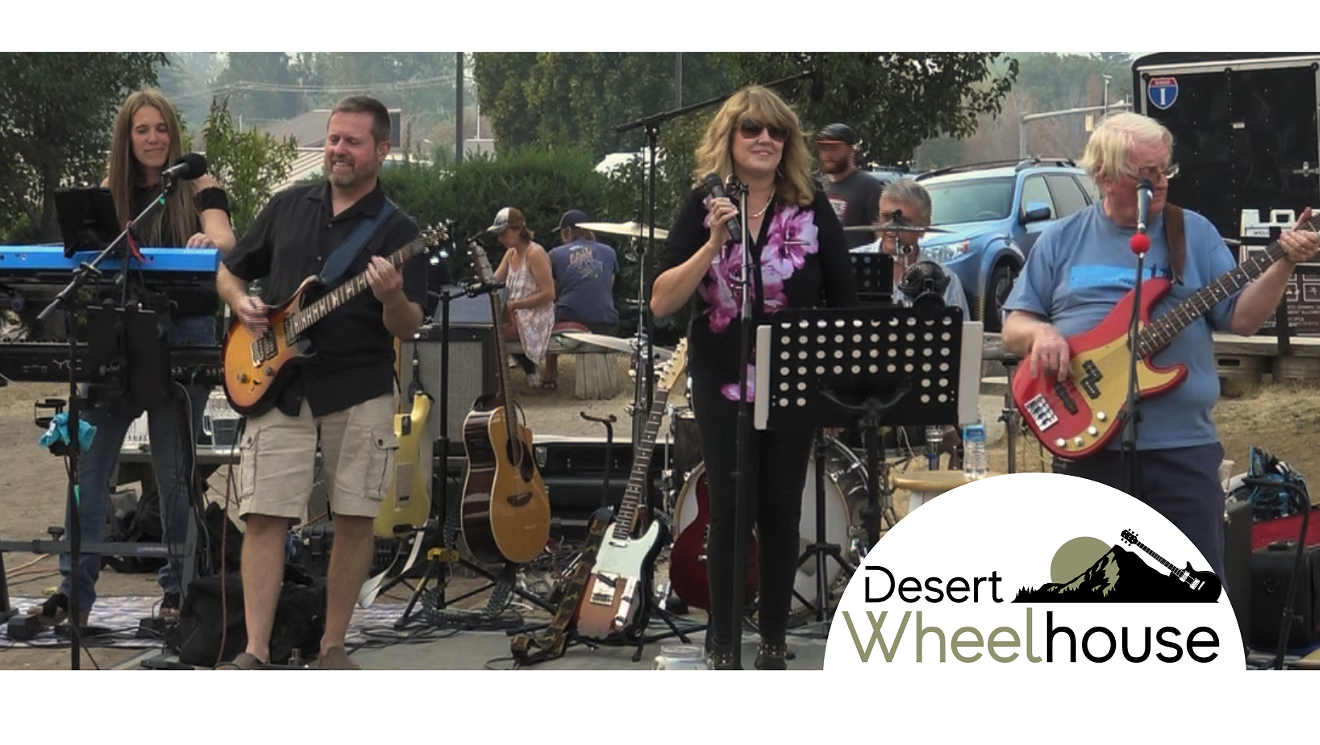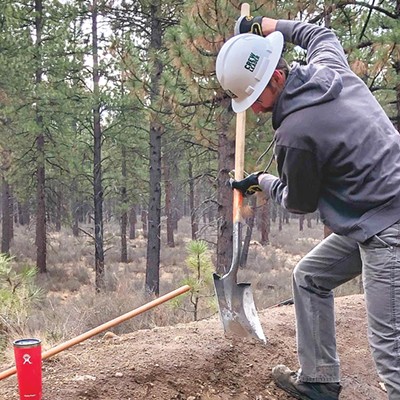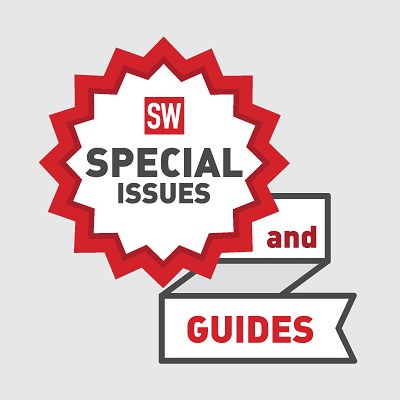Central Oregon is packed with wonder women. Below are just a few of the kick-ass females who are thriving in roles traditionally associated with men.
Not All DudesHow Sarah Robinson broke through the male majority to become an accomplished chemist
Sarah Robinson has always been a science nerd.
The Oregon native holds a Ph.D. in organic chemistry and her graduate work included diving in Papua New Guinea in search of sponges that contain anti-cancer properties.
But it wasn't always easy for Robinson, a petite, smiling strawberry blonde, to break into the world that she loved.
"There was always a science club [in middle school], but it was all dudes," Robinson says.
Once in high school, however, Robinson joined a science club, despite the male majority. And the chemistry wiz has been awash in a world of experiments, research and exploration ever since.
Robinson, 32, is the senior analytical chemist and study director at Bend's Validation Resources, a testing agency that provides analytical chemistry services to the pharmaceutical industry. On most days she wears a lab coat and goggles. And while much of her work involves analyzing data, answering emails and attending project team meetings, she still relishes any opportunity to solve puzzles via scientific experimentation.
"Oh man, that's what I want to do [all the time]," says Robinson enthusiastically.
Robinson's experiments are meaningful, too, not just the theoretical stuff of academia. A good chunk of her work involves testing various plastics—products like IVs and syringes—to confirm that little to none of the plastic is leaching into the drugs that are supposed to help people.
"It's really in the spotlight right now," says Robinson. "The FDA is starting to hammer down on people to make sure plastic hasn't altered the components of the drug."
It's important, fulfilling work, Robinson says, happy to have found such a job in a town that also allows her to go mountain biking and play outside. But life is not always so easy for women scientists.
Pursuing postdoctoral training and staying in academia and starting a family are almost entirely mutually exclusive, Robinson says.
"The time you finish grad school in your late 20s/early 30s, a lot of women are thinking about having families," says Robinson. "But if you're looking to get tenure, it's impossible to have a family. So I think it discourages women."
An equitable pay scale for women also remains an issue.
"You don't get the same salary as dudes do," Robinson says, though she adds that her own compensation is fair. "I've been to seminars to teach women how to bargain for an equal wage."
Advancements, however, have been made.
Robinson, who earned her Ph. D. at University of California, Santa Cruz, says the U of C school system "does a pretty good job of trying to get girls into science." And she says that the other women in her field are amazing.
"The best part about being a female scientist is all the women that do it are awesome," says Robinson. "But I don't think it's gender-specific. For the most part, people who pursue an advanced degree are doing it because they love it."
In a field dominated by dudes, Robinson offers this bit of sensible advice to the world's aspiring female scientists:
"You just have to get to a point where you don't care any more that it's all guys."
Fight Like a Girl
Wildland fire isn't just a boys club
What's it like to be on the front lines of a wildfire? According to Deana Wall, it's one of the best feelings in the world.
"I love being on the fire line, I love my time there. Almost all 16 of those hours in a day I'm thinking, 'This is where I need to be,' " said Wall. "It doesn't hurt that I'm not afraid to get dirty."
Being a wildland firefighter wasn't always the plan for Wall. After receiving a degree in biology from Lewis & Clark College in Portland, she began working for the Forest Service as a biological technician. When she was offered an opportunity to go to firefighting guard school, she happily accepted. After she was dispatched to her first fire, there was no turning back.
"I loved the hard work, the physical and mental challenges that fire introduces," said Wall. "I always played sports growing up, and the team canaraderie was an instant attraction for me."
Wall says that her career in fire fighting has given her the opportunity to see the country, from Alaska to Florida, in a way that very few others have.
"What I love about fire is it doesn't follow our trail system," said Wall. "I've been in a ton of backcountry and seen a ton of things off of trails that other folks would never see. It's a pretty amazing opportunity to get paid to do that."
In the Bend/Fort Rock Ranger District, women occupy five of the 35 permanent positions in fire management.
"We have women within the firefighting organization working every job from on the line to fuels management," said Jean Nelson-Dean, public affairs coordinator for the Deschutes National Forest. "These women work in wildfire behavior and have technical specialties. In Central Oregon we have several women in leadership positions who have risen from the line and are professional firefighters and fire managers."
Man or woman, it takes hard work and dedication to do the job well.
"There is a five-mile hike with a chain saw on my back that I will never forget," recalled Wall. "It was uphill and a particularly rough last mile to the top of the mountain. That hike will always remind me that I can do anything I set my mind to doing."
Along with the physical challenges of the job, Wall described the challenge of balancing her career with her family.
"You're going to find a work- life balance in every career-oriented mom. A huge part of my success has been having a supportive husband," said Wall.
Spending time on the fire line away from her husband of five years, Jason, and their young son, Connor, can be hard. The balance is especially demanding with another son due in August, but it's all a learning experience that Wall hopes to pass along to her boys.
"The thing I hope to instill in my sons is that they can achieve any dream they may have, and that the women in their lives will be able to achieve any dreams they have, as well."
Building the She Tribe
Online book connects women and their stories
When Sarah McMurray was diagnosed with polycystic ovarian syndrome six years ago, it was art that helped her to come to terms with the diagnosis and helped her find a way to empower women long after first learning of her disease.
"Art became this healing catalyst for me," explained McMurray as she sipped an espresso at a local coffee shop. She was wearing a bright cardigan and a smile that stayed on her face for our entire interview. "It helped me process what it means as a woman that might never have children, and knowing that changes everything I thought my life was going to be about."
McMurray does it all. The local photographer, artist, writer and lady behind the She-Tribe is giving women an outlet to share their stories and their wisdom through art, the outlet that she found so helpful in her time of crisis.
In February, McMurray released the first addition of "Wild She-Tribe," a compilation of stories told by women for women. The theme of the inaugural release was what women need to know, and the final edition includes 22 submissions from women across the nation discussing everything from being a mother to having a miscarriage to feminine creativity.
The idea was born last summer when McMurray was asked to photograph Camp Catalyst, a retreat event for women put on by Shine Global.
"I was having so much fun hearing the women's stories—why they came together and what they were passionate about. I thought I would love to find a way to connect women after this—to share stories and celebrate the passions and strengths we all have," said McMurray.
McMurray put out a call for submissions on her own blog, and in several arts-based Web communities she is a part of. Submissions came in from as far as the East Coast. Women shared versions of their own experiences in the form of poems, letters and creative stories. McMurray compiled the submissions, laid out the pages, and created much of the internal artwork for the book.
"I was shocked and amazed at what they decided to share because I didn't know these women for the most part," said McMurray. "It's authentic."
McMurray also collected some stories locally, and teaches writing workshops at the Workhouse, where she has an art studio. The workshops encourage women to embrace their creativity and develop their voice.
"She not only gets you in touch with your creative side and how to express it, but she also gives you a soulful experience," said Padma Maxwell, who both contributed to the She-Tribe e-book and has taken workshops with McMurray. "She helps you to go within yourself to get the jewels that you want to share that you probably weren't even aware of when you walked into the workshop."
Most recently, McMurray hosted a writing workshop at the 2013 Muse Conference.
"What I love about it is when people start telling their stories they get emotional. There were tears and laughter and some profound insight," said McMurray.
The plan for the future of the She-Tribe is expansive. The first addition is available free online, and McMurray hopes that, eventually, it can become a monthly publication of submissions on women's issues from body image to entrepreneurship.
"I want it to not just be a little tiny Bend," said McMurray. "But something that connects women all over the world."
A Wild She-Tribe Project
Available online at issuu.com/she-tribe-project and sarahmcmurray.weebly.com
Next issue: Body Image/ Self-Love submission deadline April 1
Be the Muse You Want to See in the World
Women's conference brews good feelings and future projects
The hash tags I would assign to last weekend's Muse conference are as follows: #change #inspiration #empowerment.
These were the three most used words at Muse, Bend's first-ever women's conference, which drew over 300 attendees to The Tower Theatre last Saturday. The event took place over two days and brought together women from all walks of life to discuss how freaking awesome we are and how awesome we have the potential to be.
Saturday consisted of a full day of inspirational speakers, panels and presentations, followed by a day of interactive workshops on Sunday, offered by female musicians, artists, chefs, yogis and more.
"We were doing what most of us don't take enough time to do in our lives. We were listening to each other, supporting each other and inspiring each other," said Amanda Stuermer, one of the event's coordinators. "We were connecting as a community around a shared interest in women's issues."
From Stuermer's 10-year-old daughter to the mothers and grandmothers in the audience, the focus of the conference was women, women, women. Big, small, old, young, black, white and everything in between, all backing the same mantra:
Be the change you want to see in the world.
"Women are an untapped resource. We have incredible power to make change," said Stuermer. "We want to help women tap into their own power so they can be an agent of change through the choices they make and in the way they raise their families."
The most memorable moments of the conference, for me, came from keynote speaker Tererai Trent's address in which she discussed her personal journey from an impoverished uneducated woman in Zimbabwe to the day she walked across the stage at Western Michigan University with a doctoral diploma in her hand.
Trent's presence was powerful. She wore her hair tied up into a turban and a floor-length dress that sparkled across the stage as she addressed the audience, sometimes whispering, sometimes nearly yelling, all in her punchy sing-songy cadence. Her speech was almost empowering slam poetry. She spoke passionately of breaking the cycle of poverty and abuse that had plagued her mother and grandmother, of education as a basic right, of raising champions, and of the power of connectedness, which was a common thread throughout the weekend.
"You hear about people like Tererai who have overcome these extreme obstacles—it makes our journey seem more doable," said Stuermer. "It makes our dreams seem more achievable, as she would say."
Now, it seems as if anything is achievable. Stuermer said the weekend planted seeds for projects and ideas that participants and the sponsoring organization, Shine Global, hope to carry out in the upcoming year, including service projects for teens based around women's issues. They hope to present their success with these new projects at the 2014 Muse conference.
#waytogoladies #girlpower
BendFilm Fueled by Grrl Power
Wonder Woman is a near-perfect icon for women's rights.
Lynda Carter, the actress who in the mid-to-late '70s popularized the comic book heroine, was strong, clever and sexy. Carter continued to advance equal rights even after her acting career slowed down. She's a pro-choice advocate and supports legal rights for the LGBQ community. Never one to shy away from confrontation, the woman who once deflected bullets with her bracelet, slammed Sarah Palin in 2008, calling the Republican vice presidential nominee the "anti-Wonder Woman."
It's fitting, then, as BendFilm gears up for its 10th anniversary, that the upcoming screening of the award-winning documentary Wonder Women! coincides with a new BendFilm fundraising campaign, Indie Women for Indie Film.
Last year, lacking the money for a few important festival awards, BendFilm Director Orit Schwartz reached out to her friend Pamela Hulse Andrews, CEO and founder of Cascade Publications Inc. Andrews promptly rounded up 10 female friends who all contributed $100. Those friends brought in more friends, and pretty soon the circle of women grew to 100 and had raised more than $2,000 to be used toward this year's awards.
And on Thursday, March 14, at The Tower BendFilm is hosting a screening of Wonder Women! The Untold Story of American Superheroines, a 2012 film that won best documentary and best director at last year's festival. The film, which focuses on Lynda Carter, asks, "What are the consequences for women when they are strong and when they are the central actors in their own lives?"
"We tend to forget all the hard work that's been done," said Schwartz about the fight for equal rights for women. "We kinda act like we won the battle, but it's not true. We're psyched we're able to do this one."

